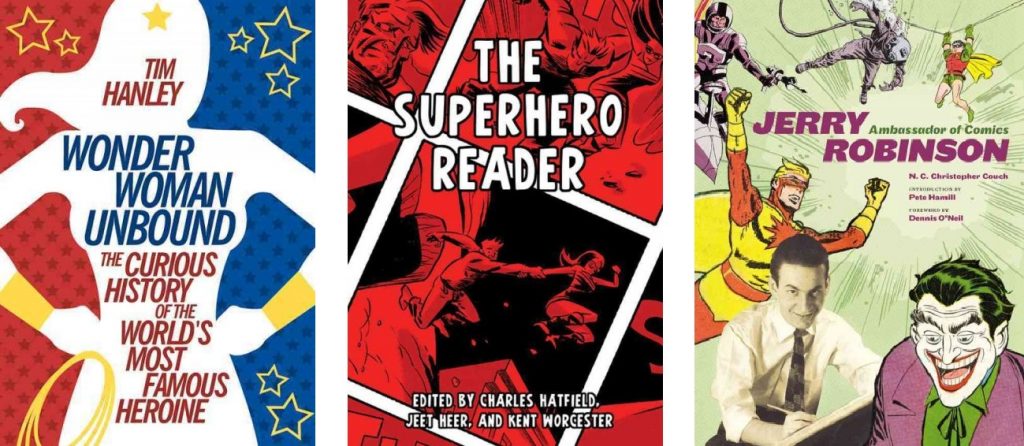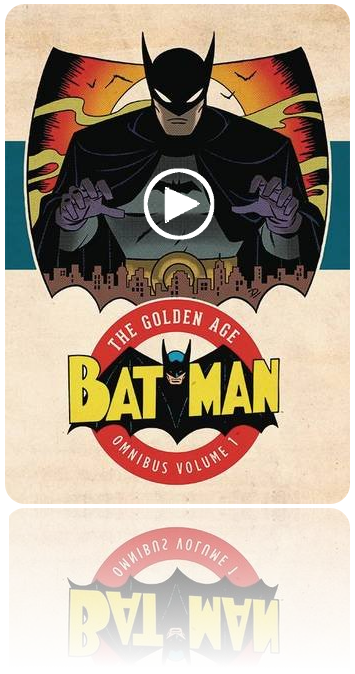COMICS, GRAPHIC NOVELS, AND POPULAR CULTURE
Most of us have heard of comics and graphic novels, but what are they really?
- Comics and graphic novels are a form of Sequential Art.
- They are a series of illustrations read in a specific order.
- Manga is a form of sequential art that is read left to right.
- Sequential art may or may not contain written text.
- Historical examples of include: cave paintings, frescos, and tapestries.
Now that you know what comics and graphic novels are, where did they come from?
- Comics got their start in the late 19th century. They were the product of “circulation wars” between rival newspapers.
- In 1933 a Connecticut printing company produced a booklet of comic strips as a promotion.
- These reprinted strips were rooted in comedy, and the term comic book was born.
- Costumed adventurers and crime fighters shortly appeared, leading to a postwar boom of superhero comics. This Golden Age of comics was the first step in a cycle.
The Golden Age of Comics
- The Golden age of comics spanned from the late 1930’s to the 1950’s.
- Action Comics #1 launched the golden age with the introduction of Superman.
- Many iconic Marvel and DC characters got their start in the golden age.
- Early comic book foes were typically gangsters and mad scientists.
- Once the United States entered World War II, the Axis Powers became the new antagonists.
- With the end of World War II the golden age of comics made way for the silver age.
The Silver Age
- The Silver age of comics ran until the early 1970’s.
- Heroes in this post-war era battled costumed criminals and Communist agents.
- A crackdown on comics ensued after the publication of Seduction of the Innocent.
- Afraid of government interference comic book publishers agreed to self-regulate the industry, and the Comics Code Authority (CCA) was born.
- The CCA restricted what could be depicted in comics. These ranged from bans on graphic violence, to restrictions of words such as: criminal, horror, and terror.
- Comics that did not bear the CCA seal of approval were not carried by distributers or sold in comic shops. This led to the underground comic book movement.
The Bronze Age and Modern Age Comics
- The Bronze Age of comics began as a response to the CCA restrictions.
- Comics during this age tackled social issues such as addiction, racism, and poverty.
- Marvel Comics was approached by the U.S. Department of Health to create a story arc in which the dangers of drug abuse would be featured.
- The CCA refused to give their approval, and Marvel released the comic without the CCA seal.
- With the popularity of the comic the CCA was forced to revise the comics code.
- A series of further revisions weakened the hold of the CCA, seeing the return of horror and other banned genres. This would set the stage for a new age of comics.
- The Modern Age of Comics began in mid the 1980’s with titles like Watchmen and The Dark Knight Returns. These comics explored the political ramifications of costumed heroes.
- Early comics from this era were heavily stylized, and contained stark portrayals of violence.
- These morally ambiguous comic titles led to the rise of several popular the anti-heroes.
- Towards the end of the 1980’s comic book publishers were producing “limited edition” comics with variant covers. The production of these gimmick comics outstripped the demand leading to a crash within the industry.
Back to School Heroes
COMICS, GRAPHIC NOVELS, AND POPULAR CULTURE

The Peabody Institute of Danvers has more than graphic novels and superhero DVDs. We have an extensive collection of non-fiction titles on comic books and popular culture. Biographies on movers and shakers within the comic book industry. Books on comic book history, detailing the rise of comics and impact of popular culture. Finally, a range of books dealing with literary theory and philosophy within comics and pop-culture. Here are a few suggested titles.
Biography
- Jerry Robinson: Ambassador of Comics, N.C. Christopher Couch
- Kirby: King of Comics, Mark Evanier
- Life in Pictures: Autobiographical Stories, Will Eisner
- In the Shadow of No Towers, Art Spiegelman
History
- The Legion of Regrettable Super Villains, Jon Morris
- Marvel Comics: The Untold Story, Sean Howe
- Men of Tomorrow: Geeks, Gangsters and the Birth of the Comic Book, Gerard Jones
- Superman versus the Ku Klux Klan, Rick Bowers
- Wonder Woman Unbound: The Curious History of the World’s Most Famous Heroine, Tim Hanley
Literary Criticism
- Girls and Their Comics: Finding a Female Voice in Comic Book Narrative, Jacqueline Danziger-Russell
- Last Night, a Superhero Saved My Life, Liesa Mignogna
- The Superhero Reader, Charles Hatfield
- Understanding Comics, Scott McCloud






